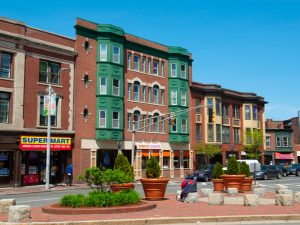Advocates demand equitable participation
in MA’s energy efficiency program

Chelsea, Masachusetts
Massachusetts — At the Massachusetts Energy Efficiency Advisory Council (EEAC) meeting, community organizations and advocates of the Green Justice Coalition (GJC) demanded that the EEAC improve equitable access to low-to-moderate income families, immigrants, people with English isolation, and renters, and must ensure that the data on whom energy efficiency programs are serving is transparent and publicly available.
“Wealthier communities and homeowners access the Mass Save program six to seven times more than low-income, language-isolated, and environmental justice communities,” the coalition wrote in their testimony submitted to the Council. “Mass Save funds its energy efficiency programs with the utility bill contributions of all customers of investor-owned utilities in Massachusetts. The overall budget for the state’s most recent three-year energy efficiency plan was $2.8 billion – a considerable sum. Nonetheless, the major utility companies, as well as independent policy analysts, have found that ‘renters, lower-income residents, and non-English speakers are less likely to benefit‘ from the program. Low-income households contribute a greater proportion of the burden of our energy system.”
The coalition, which is comprised of community‐based, labor, and environmental justice advocacy groups representing over 100,000 ratepayers across the Commonwealth, noted that for “state’s most recent three-year energy efficiency plan was $2.8 billion.” However, the savings from this plan are not available to all sections of the community, making Mass Save, the free program that helps families lower their energy costs, inaccessible and inequitable.
“Our disadvantaged communities, including our environmental justice communities, are the ones in need of programs like Mass Save,” said Lee Matsueda, Executive Director, Community Labor United. “And yet, these are the communities that receive close to no benefits from this program. The EEAC must take immediate action to eliminate this disparity and ensure that all of our communities can reap the rewards of this program.”
Members of the statewide GJC have advocated, for over a decade, for sensible program adjustments to address these longstanding challenges. They are urging for the improvements in these areas to be made by the EEAC through explicit directives to the Program Administrators (PAs). Increase support for “moderate-income” populations, fund pre-weatherization measures, target outreach in specifically low-income & communities of color — these are the three of many recommendations offered by the GJC.
“We urge officials to put disadvantaged and underserved communities first and reject any plan that does not center their needs wholly and transparently,” the coalition wrote in their testimony.
About The Green Justice Coalition:
The Green Justice Coalition (GJC) is a partnership of community-based, environmental, and labor allies who lead campaigns that have a meaningful impact on working-class people and communities of color. Together, our members organize and advocate for a just transition to a sustainable economy that allows our communities to achieve environmental and economic justice. GreenJusticeCoalition.org
